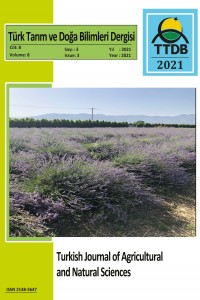Çoklu Özellikli Bakteri Esaslı Biyo-Formüllerin Çay Gelişme, Verim ve Enzim Aktivitesi Üzerine Etkisi
Abstract
Bu araştırma mineral gübre, ticari mikrobiyal gübre ve azot fikseri, fosfat çözücü ve ACC deaminaze aktivitesine sahip bakteri esaslı üçlü kombinasyonlar halinde üç farklı mikrobiyal gübre formülasyonunun ((BF9: Bacillus megaterium 47/9+ Paenibacillus macquariensis RC696 + Pseudomonas fluorescens 9/7; BF10: Bacillus megaterium RC665+ Paenibacillus macquariensis RC382 + Pseudomonas fluorescens 9/7; BF11: Bacillus simplex RC64 + Pseudomonas putida 3/10 + Burkholderia pyrrocinia RC134)) asidik tarla koşullarında üç yıllık sürede çay gelişme ve enzim aktivitesi üzerine etkisinin belirlenmesi amacıyla yürütülmüştür. Deneme tesadüf bloklarında altı uygulama ve dört tekerrürlü ( her bir tekerrürde beş çay öbeği) olarak kurulmuştur. Bakteri formülasyonları yaprak alanı, yeşil yaprak verimi, klorofil içeriği ve enzim aktivitesi dahil gelişmeyi teşvik etmiştir. Ayrıca, bakteri formülasyonu aşılamaları, glutatyon redüktaz (GR), glutatyon S-transferaz (GST), glukoz 6-fosfat dehidrogenaz (G6PD), 6-fosfoglukonat dehidrogenaz (6PGD), polifenol oksidaz (PPO), peroksidaz (POD) 5-dehidroksişikimat redüktaz (DHSK) ve alkol dehidrogenaz (ADH), enzim aktivitesini değiştirebilmiştir. Seçilen etkin aside toleranslı çoklu özelliklere sahip bakteri esaslı biyo-formülasyonlar, strese bitki toleransı ve adaptasyonu, işleme teknolojisinde önemli bir rol oynayabilir ve çay ürünlerinin kalitesi konseptine katkıda bulunabilir. Bu çalışma, bu yerli faydalı rizobakteri izolatlarının, çay mahsulünün büyümesini teşvik etmek için mikrobiyal aşılama veya biyo gübre olarak kullanılma potansiyeline sahip olduğunu ve sürdürülebilir çay yetiştiriciliği için umut verici olduğunu göstermektedir.
Keywords
Camellia sinensis L. birlikte aşılama biyolojik gübre verim ve kalite bitki gelişmesini teşvik edici bakteri
References
- Akbari, G.A., Arab, S.M., Alikhani, H.A., Allahdadi, I., Arzanesh, M.H. 2007. Isolation and selection of indigenous Azospirillum spp. and the IAA of superior strains effects on wheat roots. World Journal of Agricultural Sciences, 3 (4):523-52.
- Asghar, H.N., Zahir, Z.A., Arshad, M., Khaliq, A. 2002. Relationship between in vitro production of auxins by rhizobacteria and their growth-promoting activi¬ties in Brassica juncea L. Biology and Fertility of Soils, 35:231-237.
Effect of Co-Inoculation of Multi-Traits Bacteria Based Bio-Formulations on the Growth, Yield and Enzyme Activities of Tea
Abstract
The objective of this study was to evaluate possible effects of mineral fertilizer (NPK), one commercial and three N2-fixing, P-solubilizing and/or ACC deaminase-containing bacteria based bio-fertilizers in triple strains combinations (BF9: Bacillus megaterium 47/9+ Paenibacillus macquariensis RC696 + Pseudomonas fluorescens 9/7; BF10: Bacillus megaterium RC665+ Paenibacillus macquariensis RC382 + Pseudomonas fluorescens 9/7; BF11: Bacillus simplex RC64 + Pseudomonas putida 3/10 + Burkholderia pyrrocinia RC134) were evaluated for their growth and enzyme activities of tea under acidic soil conditions, in three years. The experiment was conducted in a completely randomized design with six treatments and four replicates (each having five tea bushes). Bio-fertilizers formulations stimulated overall plant growth, including leaf area, green leaf yield, chlorophyll content and enzyme activities in tea. In addition, inoculation with bacterial formulation, activities of the different enzymes like glutathione reductase, glutathione S-transferase, glucose-6-phosphate dehydrogenase, 6-phosphogluconate dehydrogenase, polyphenol oxidase, peroxidase, urease, 5-dehydroshikimate reductase, and alcohol dehydrogenases also changed. The selected effective acid-tolerant multi-traits bacteria based bio-formulations could play an important role in understanding the plant tolerance and adaptation to stress, processing technology, and may contribute to the concept of the quality of tea products. This study shows that these indigenous beneficial rhizobacteria isolates have the potential to be used as microbial inoculation or bio fertilizer to stimulate tea crop growth and are promising for sustainable tea cultivation.
Keywords
Camellia sinensis L co-inoculation bio-fertilizers yield and quality plant growth promoting rhizobacteria
References
- Akbari, G.A., Arab, S.M., Alikhani, H.A., Allahdadi, I., Arzanesh, M.H. 2007. Isolation and selection of indigenous Azospirillum spp. and the IAA of superior strains effects on wheat roots. World Journal of Agricultural Sciences, 3 (4):523-52.
- Asghar, H.N., Zahir, Z.A., Arshad, M., Khaliq, A. 2002. Relationship between in vitro production of auxins by rhizobacteria and their growth-promoting activi¬ties in Brassica juncea L. Biology and Fertility of Soils, 35:231-237.
Details
| Primary Language | English |
|---|---|
| Journal Section | Research Articles |
| Authors | |
| Publication Date | July 26, 2021 |
| Submission Date | October 8, 2020 |
| Published in Issue | Year 2021 Volume: 8 Issue: 3 |


